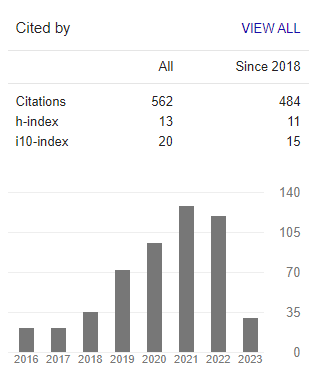MIND, SELF, AND SOCIETY IN THE ONLINE GAY COMMUNITY: Study on Grindr Apps
Abstract
Self-identity is a unified thing with someone's self-concept. The experience that is owned by someone is personal knowledge from experiencing and having various moments and references. The advancement of information technology in the Industry 4.0 era is now facing 5.0, opening up the opportunity to youths especially generation Z (Gen Z) who much more cares about freedom, having high self-confidence, and capability to quickly adopt various applications across internet media outlets. Nevertheless, they lack eagerness to dig deeper into something. Those factors have influenced the development of their self-concept through internet media. Grindr has known as an online gay-dating application, where a homosexual male exposes himself to what he wants to be seen by other users. This article focused on the review and describe how the self-concept development process of gen Z in using the application. Analyze the research using Mead's symbolic interactionism theory, furthermore to find out what factors that influence self-concept development of the application active users in their daily life. This research using virtual ethnography to four homosexual men in the age of 16-23. The results indicated that through the online application, a homosexual male is capable to develop his self-concept that wants to be seen on that medium. Moreover, the close read of data also uncovered at least ten types of aforesaid application users based on the self-concept that they form
To cite this article (7th APA style):
Pranata, R. H. and Putri, D. M. (2020). Mind, Self, and Society in the Online Gay Community: Study on Grindr Apps. Journal Communication Spectrum: Capturing New Perspectives in Communication, 10(1), 68-82. http://dx.doi.org/10.36782/jcs.v10i1.2007
Keywords
References
Acocella, J. R. & Calhoun, J. F. (1990). Psychology of Adjustment Human Relationship. McGraw-Hill.
Ardianto, E. (2007). Komunikasi Massa Suatu Pengantar [Mass Communication: An Introduction]. Simbiosa Rekatama.
Arif, M. (2012). Etnografi Virtual: Sebuah Tawaran Metodologi Kajian Media Berbasis Virtual [Virtual Ethnography: A Collection of Virtual Based Media Study Methodologies]. Jurnal Ilmu Komunikasi 2(2), 165-179.
Burns, R. B. (1993). Konsep Diri: Teori, Pengukuran, Perkembangan dan Perilaku (Alih Bahasa: Eddy) [Self-concept: Theory, Measurement, Development and Behavior. Translated by Eddy]. Arcan.
Damhuri, E. (2019, February 16). Media Sosial, Incaran Kaum LGBT [Social Media, Targeting LGBT People]. Republika. https://republika.co.id/berita/retizen/surat-pembaca/19/02/16/pmzvkr440-media-sosial-incaran-kaum-lgbt
Dizik, A. (2017, May 9). Media Sosial: Ketergantungan yang lebih parah daripada alcohol atau narkoba [Social Media: Addiction that is more severe than alcohol or drugs]. BBC. https://www.bbc.com/indonesia/vert-cap-39791239
Hossain, F. & Ferreira, N. (2019). Impact of Social Context on the Self-Concept of Gay and Lesbian Youth: A Systematic Review. Global Psychiatry 2(1), 51-78.
Hurlock, E. B. (2005). Perkembangan Anak [Child development]. Erlangga
Ives, J. (2018). “It’s Just Horny Fun…” Grindr and Its Influence on Young Gay Men’s Attitudes towards HIV and Risky Sexual Behavior. Journal of Promotional Communications 6(3), 375-394.
Jasmadi. (2008). Membangun Komunitas Online Secara Praktis dan Gratis [Build a Practical and Free Online Community]. Elex Media Komputindo.
Leary, M. R. & MacDonald, G. (2003). Individual Differences in Self-esteem: A Review and Theoretical Integration. The Guildford Press.
McQuail, D. (2011). Teori Komunikasi Massa McQuail, Edisi 6 Buku 1 [McQuail's Theory of Mass Communication, 6th edition of Book 1]. Salemba Humanika
Meyer, I. H. (2003). Prejudice, Social Stress, and Mental Health in Lesbian, Gay, and Bisexual Populations: Conceptual Issues and Research Evidence. Psychological Bulletin 129(5), 674-697.
Morgans, J. (2018, March 12). Media Sosial Sejak Awal Memang Dirancang Agar Manusia Kecanduan. [Since the beginning, Social Media was designed so that humans become addicted]. Vice. https://www.vice.com/id_id/article/3k7g75/media-sosial-sejak-awal-memang-dirancang-agar-manusia-kecanduan
Mulyana, D. (2001). Ilmu Komunikasi: Suatu Pengantar [Communication Studies: An Introduction]. Remaja Rosdakarya.
Mulyana, D. (2010). Metodologi Penulisan Kualitatif [Qualitative Writing Methodology]. Remaja Rosdakarya.
Nasiri, M. (2016, August 14). Membaca Generasi Z Lewat Perilaku di Media Sosial [Reading Generation Z through Behavior on Social Media]. CNN Indonesia. https://www.cnnindonesia.com/gaya-hidup/20160812134839-277-150948/membaca-generasi-z-lewat-perilaku-di-media-sosial
Primawati, A. (2011). Strategi Penggunaan e-TKI sebagai Wahana dalam Mengatasi Kesenjangan Informasi [The Use of e-TKI as a Medium for Reducing the Information Gap]. Journal Communication Spectrum, 1(2), 185-202
Putri, D. M. (2012). Pembentukan Konsep Diri Anak Usia Dini di One Earth School Bali [The formation of Self-Concept of Early Childhood in One Earth School Bali]. Journal Communication Spectrum 2(1), 100-117
Rakhmat, J. (2009). Psikologi Komunikasi [Communication Psychology]. Remaja Rosdakarya.
Rakhmat, J. (2018). Psikologi Komunikasi (Edisi Revisi) [Communication Psychology. Revision Edition]. Simbiosa Rekatama Media.
Rayport, J. F. & Jaworski, B. J. (2004). Introduction to E-Commerce (2nd Edition). McGraw-Hill.
Shield, A. DJ. (2018). Grindr Culture: Intersectional and socio-sexual. Ephemera: Theory & Politics in Organization, 18(1), 149-161.
Situmorang, A. (2018, December 10). Ini 6 Hambatan Pengembangan Industri 4.0 di Indonesia [These are 6 Obstacles to Industrial Development 4.0 in Indonesia]. Merdeka.com. https://www.merdeka.com/uang/ini-6-hambatan-pengembangan-industri-40-di-indonesia.html
Sobur, A. (2003). Psikologi Umum dalam Lintasan Sejarah [General Psychology in Historical Paths]. Pustaka Setia.
Stuart, G. W. & Sundeen, S. J. (1991). Principles and Practice of Psychiatric Nursing. Mosby Year Book.
Syamsiah, M. N. (2017, November 20). 7 Karakteristik Generasi Z yang Perlu Kamu Tahu [7 Characteristics of Generation Z that You Need to Know]. Kumparan.com. https://kumparan.com/kumparannews/7-karakteristik-generasi-z-yang-perlu-kamu-tahu/full
Tom. (2017. May 26). Grindr Sold to Beijing Kunlun Tech. Datingsitesreviews.com. https://www.datingsitesreviews.com/article.php?story=grindr-sold-to-beijing-kunlun-tech
Trebay, G. (2014, December 12). The Sex Education of Grindr’s Joel Simkhai. Nytimes.com. https://www.nytimes.com/2014/12/14/fashion/the-sex-education-of-grindrs-joel-simkhai.html
Utz, P. (2016. August 25). An Encounter with Joel Simkhai, founder of Grindr. Numero.com. https://www.numero.com/en/culture/culture-encounter-joel-simkhai-founder-grindr
Widiyarti, Y. (2019, January 6). Mengenal Karakter Generasi Z, Mandiri, Keras Kepala tapi Inovatif [Get to know the Character of Generation Z, Mandiri, Stubborn but Innovative]. Tempo. https://cantik.tempo.co/read/1162188/mengenal-karakter-generasi-z-mandiri-keras-kepala-tapi-inovatif/full&view=ok
Wulandari, C. R. (2019, December 3). Waspadai Dampak Buruk Revolusi Industri 4.0 [Beware of Adverse Effects of the Industrial Revolution 4.0]. Pikiran-rakyat.com. https://www.pikiran-rakyat.com/pendidikan/pr-01324080/waspadai-dampak-buruk-revolusi-industri-40?page=3.
Wulansari, D. (2009). Sosiologi: Konsep dan Teori [Sociology: Concept and Theory]. Refika Aditama
Zervoulis, K. Lyons, E. & Dinos, S. (2015). Stigma and Self-esteem across Societies: Avoiding Blanket Psychological Responses to Gay Men Experiencing Homophobia. BJPsych Bulletin 39, 167-173.
Refbacks
- There are currently no refbacks.

This work is licensed under a Creative Commons Attribution 3.0 License.
Indexed by:
Archived in:
Listed in:
INTERNATIONAL ASSOCIATION FOR MEDIA AND COMMUNICATION RESEARCH

















